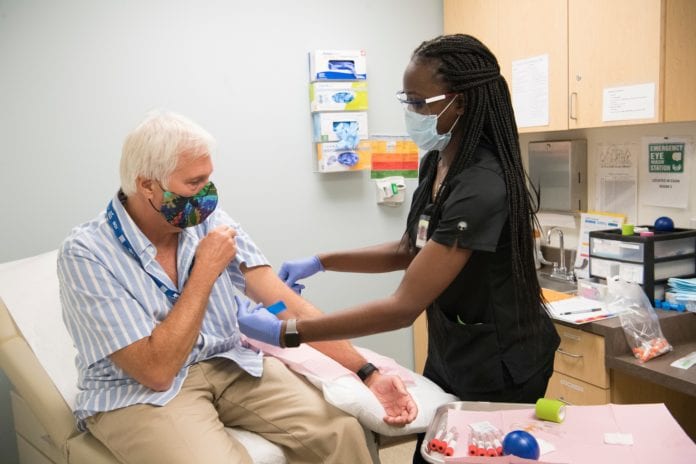The COVID-19 (2019 novel coronavirus) pandemic is a threat like none that we have ever faced.
At Emory, we are partnering with our patients to be a part of the solution. We are committed to providing the highest quality cutting-edge care to all patients within our health system while keeping our employees and patients safe. As an academic health system, we are also leading the way through clinical trials, partnering with our patients to evaluate promising emerging therapies to prevent and treat COVID.
COVID-19 came suddenly. In the beginning, there were no treatments available. Researchers and doctors at Emory and other academic institutions rapidly developed clinical trials to test potential therapies. We were one of the leading sites for the government-funded trials that helped establish remdesivir as a valuable treatment and we helped demonstrate the effectiveness of one of the promising vaccines that appears highly effective.
Our tools to treat COVID-19 continue to grow as clinical trials help us identify what treatments work and what treatments do not. Many of our patients may not be familiar with clinical trials.
We think that four key features of clinical trials are important for our patients to understand.
Clinical Trials Use the Power of Science to Drive Treatment
All trials are different, but the basic idea is to give some patients a new treatment and to give other, similar patients a different treatment. Usually, people who are not treated with the new therapy receive a placebo (saltwater or a sugar pill), so nobody knows who got what. When we do clinical trials this way, we can provide clear answers about what works and what doesn’t.
If we don’t have this evidence, we can’t really know how best to treat people. We risk giving care that is not effective or not safe for our patients. Clinical trials use proven scientific tools to make sure we arm our doctors and patients with the best evidence possible to care for people with this disease.
Clinical Trials Accelerate Progress
Clinical trials are the best way to find effective therapies for patients as fast as possible. In the context of the rapidly expanding COVID-19 pandemic, rapidly providing answers is an essential priority as more and more patients need treatment.
At times, there has been a rush to deliver treatments to patients before we have good evidence about how well those treatments work or how safe they are. While this is understandable, this approach ultimately delays the process of understanding whether these treatments work and are safe.
The fastest way to get effective, safe treatment to patients who need it is to use carefully designed clinical trials.
Clinical Trials Are Safe
Several key features of clinical trials ensure they are safe for patients who participate. First, all clinical trials undergo a comprehensive review by experts to ensure that the study treatment can help patients and provide evidence that it is safe. Second, clinical trials do not deny any patient therapy that is known to be effective. While some patients in clinical trials receive the study treatment, and others might receive a placebo, all patients in our clinical trials receive state-of-the-art treatment. Third, clinical trials set up independent expert committees to monitor progress as the trial is ongoing.
If there is evidence that the treatment being tested is causing harm or determined not to be effective, the organization will stop the trial.
Clinical Trials Are a Team Effort
Clinical trials represent a team effort between doctors, researchers, and patients. Patients make clinical trials successful and are the number one priority. By including a broad range of patients of different ages, races, and medical conditions, we can make sure that we understand what works best for all of our patients.
Without any of these team members playing their role, trials would not be possible. And we would not be able to improve care for COVID-19 and other severe diseases.
At Emory, we are committed to partnering with our patients in every way. We work together to advance treatment for our patients and the world. As a patient in a leading academic health system, there may be opportunities for you to participate in COVID-19 clinical trials. From testing vaccines and other preventative therapies to testing treatments for people at home and in the hospital, you can join the fight.
Together, we can move the needle on this disease.
More Clinical Trials Are Still Needed
Just because we now have authorized vaccines, it does not mean that the work of clinical trials for COVID-19 is over or any less important. We still need clinical trials testing additional vaccines in order to have an adequate supply of vaccine for everyone. We still need effective treatments for people who get sick with COVID-19 to prevent serious illness and to improve care for people who do become severely ill. At Emory, we continue to lead the charge in these efforts in partnership with you, our patients.
Volunteer to Become a Clinical Trials Participant
About Dr. Dickert
 Neal Dickert, MD, PhD, is Assistant Professor of Medicine in the Division of Cardiology. He also holds a secondary appointment in the Department of Epidemiology at the Rollins School of Public Health and is a senior faculty fellow at the Emory Center for Ethics. He also serves as associate program director for the cardiology fellowship program. Dr. Dickert received his MD from the Johns Hopkins University School of Medicine and PhD from the Johns Hopkins Bloomberg School of Public Health. Dr. Dickert is board-certified in cardiology and internal medicine. Clinically, Dr. Dickert practices in the Emory University Hospital and Atlanta VA Medical Center Cardiac Care Units. Dr. Dickert’s research focuses on ethical issues relevant to cardiology practice and clinical research.
Neal Dickert, MD, PhD, is Assistant Professor of Medicine in the Division of Cardiology. He also holds a secondary appointment in the Department of Epidemiology at the Rollins School of Public Health and is a senior faculty fellow at the Emory Center for Ethics. He also serves as associate program director for the cardiology fellowship program. Dr. Dickert received his MD from the Johns Hopkins University School of Medicine and PhD from the Johns Hopkins Bloomberg School of Public Health. Dr. Dickert is board-certified in cardiology and internal medicine. Clinically, Dr. Dickert practices in the Emory University Hospital and Atlanta VA Medical Center Cardiac Care Units. Dr. Dickert’s research focuses on ethical issues relevant to cardiology practice and clinical research.



